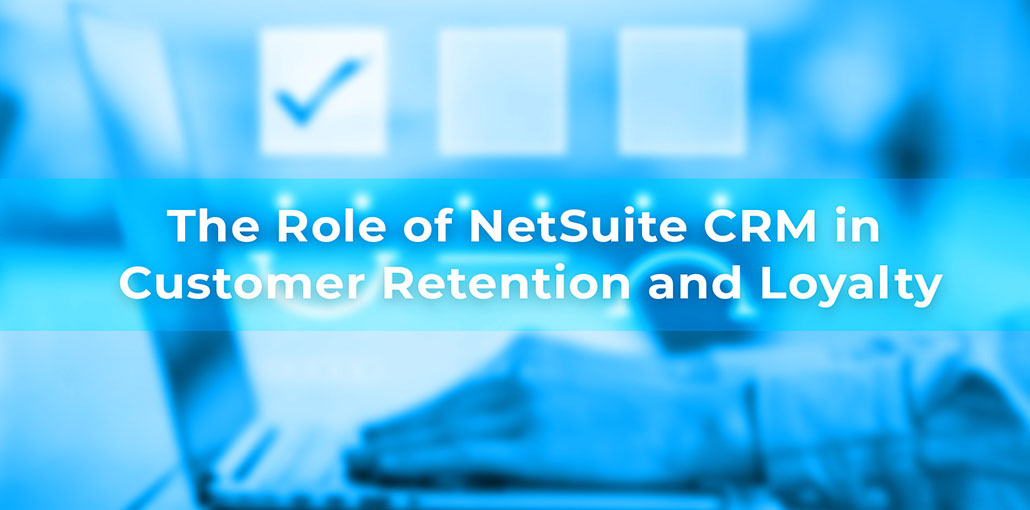Customer retention and loyalty are critical factors in any business’s success. With increasing competition in today’s market, it’s imperative for companies to retain existing customers while attracting new ones. So, this is where NetSuite CRM, a cloud-based customer relationship management system can help businesses manage their interactions with customers, streamline their operations, and improve customer satisfaction. In this article, we’ll explore the role of NetSuite’s CRM in customer retention and loyalty, using examples and statistics, but before that, let’s see what NetSuite is all about.
NetSuite ERP is a cloud-based enterprise resource planning (ERP) software solution designed to help businesses manage their financials, supply chain, manufacturing, human resources, and other core business processes.
With NetSuite, businesses can streamline and automate their operations, improve visibility and control, and gain real-time insights into their business performance. It offers a range of modules, including financial management, order management, inventory management, procurement, supply chain management, manufacturing, and human resources.
Key features include:
- Cloud-based deployment: NetSuite is a cloud-based solution, which means businesses can access it from anywhere with an internet connection without the need for expensive hardware or software installations.
- Integration: It integrates with other business applications, including customer relationship management (CRM) and e-commerce solutions, to provide a complete business management platform.
- Customization: It allows businesses to customize their workflows and processes to meet their specific needs.
- Analytics and reporting: NetSuite provide real-time insights and reporting to help businesses make informed decisions and improve their operations.
- Scalability: It’s highly scalable, allowing businesses to easily add new users and functionality as their needs change and grow.
- Overall, NetSuite is a powerful and flexible solution that can help businesses of all sizes manage their operations more efficiently and effectively.
NetSuite’s CRM provides businesses with a centralized platform to manage their customer interactions, sales, and marketing efforts. With a 360-degree view of each customer, businesses can personalize their communication and offer to meet their customers’ specific needs and preferences. This level of personalization can go a long way in building customer loyalty and improving customer satisfaction. According to a survey by Accenture, 91% of consumers are more likely to shop with brands that recognize, remember, and provide them with relevant offers and recommendations.
Here’s an example of how NetSuite helps businesses improve customer retention and loyalty to manage their operations, including customer interactions. Suppose a food manufacturer faced several challenges in managing their sales and marketing efforts before they adopted NetSuite CRM, like having multiple systems for managing their sales and marketing efforts, which resulted in data silos and inconsistencies in customer data. They also lacked a centralized platform to manage their customer interactions, which made it challenging to provide personalized recommendations and offers to their customers.
But, after implementing NetSuite’s CRM, they would see a significant improvement in their customer retention and loyalty. They will be able to personalize their communication and offerings to meet their customers’ needs and preferences, which results in increased customer satisfaction. They also gained a 360-degree view of their customers, which helped them identify trends and opportunities for growth. Owing to this implementation, they can now streamline their operations, improve their sales and marketing efforts, and grow their business.
Statistics also demonstrate the impact of CRM on customer retention and loyalty. According to a study by Salesforce, 52% of consumers are likely to switch to a different brand or company if they don’t feel appreciated. With CRM, businesses can personalize their communication and offerings, resulting in increased customer appreciation and loyalty. The same study also found that 84% of customers feel that being treated like a person, not a number, is essential to winning their business. Especially its 360-degree view of each customer helps businesses treat their customers as individuals and personalize their communication and offerings accordingly.
In addition, CRM provides businesses with the tools they need to track and analyze customer behaviour and preferences. With this data, businesses can identify trends and opportunities for growth, as well as areas for improvement. For example, businesses can use NetSuite CRM to track customer feedback and reviews, identify areas where they can improve their products or services, and take action to address those issues. By doing so, businesses can improve their customer satisfaction and retention rates, ultimately leading to increased loyalty and revenue.
Let’s see how an ERP consultant is a part of your smooth transition in enhancing your solutions.
Here are some steps that a ERP consultant take to make this solution a successful implementation
- Understanding the customer journey: captures a deep understanding of the customer journey and how it relates to the different modules in NetSuite CRM. This includes understanding the different touchpoints a customer has with your organization and how NetSuite can be used to improve those interactions.
- Identify pain points: Once they understand the customer journey, they would then identify pain points that customers experience. This would be done through customer surveys, feedback from customer support teams, and other methods. Once the pain points are identified, you can work with the ERP consultant team to develop solutions to address them.
- Map out processes: It’s important to map out processes and workflows that will be used in CRM. This includes mapping out the sales process, customer service process, and any other processes that will be impacted by the implementation.
- Configure CRM: As an ERP consultant, it’s critical that they configure CRM to meet the specific needs of your organization. This includes configuring workflows, customizing fields, and creating reports and dashboards.
- Train users: Once the CRM is configured, it’s important to train users on how to use the system effectively. This includes training sales reps, customer service reps, and other employees who will be interacting with customers.
Conclusion
In conclusion, NetSuite CRM plays a critical role in customer retention and loyalty. By providing businesses with a centralized platform to manage their customer interactions, sales, and marketing efforts, it also enables businesses to personalize their communication and offerings, resulting in increased customer satisfaction and loyalty. This case of an excellent imaginable example of how businesses can help improve their customer retention and loyalty. With statistics demonstrating the impact of personalization on customer appreciation and loyalty, it’s clear that businesses that prioritize customer satisfaction and personalization will see the most significant returns on investment.










Leave a comment